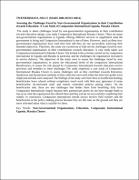| dc.contributor.author | Twemerimana, Jolly | |
| dc.date.accessioned | 2018-12-04T08:01:06Z | |
| dc.date.available | 2018-12-04T08:01:06Z | |
| dc.date.issued | 2006 | |
| dc.identifier.citation | Twemerimana, J. (2006). Assessing the Challenges Faced by Non-Governmental Organisations in their Contribution towards Education: A Case Study of Compassion International Uganda, Masaka Cluster. Uganda Martyrs University, Nkozi: Uganda Martyrs University. | en_US |
| dc.identifier.uri | http://hdl.handle.net/20.500.12280/1196 | |
| dc.description.abstract | TWEMERIMANA JOLLY (MADS 2006-MO33-10011)
Assessing the Challenges Faced by Non-Governmental Organisations in their Contribution towards Education: A Case Study of Compassion International Uganda, Masaka Cluster.
The study is about challenges faced by non-governmental organisations in their contribution towards education taking a case study Compassion International Masaka Cluster. There are many non-governmental organisations in Uganda offering different services to supplement what the government is doing and Compassion International is one of them. However, much as these non-governmental organisations have tried their best still they are not successfully achieving their intended objectives. Therefore, the study was carried out to find out the challenges faced by non-governmental organisations in their contributions towards education. A case study taken was Compassion International in Masaka Cluster. We looked at the activities carried out by compassion international in Uganda and Masaka in particular and the challenges the organisation encounters in service delivery. The objectives of the study were to assess the challenges faced by non-governmental organisations; to assess the educational needs of the compassion International Beneficiaries; to assess the role played by Compassion International towards education service provision and remedies to these challenges The study employed a case study of Compassion International Masaka Cluster to assess challenges met as they contribute towards Education. Qualitative and Quantitative methods of data collection were used where the interview guides were employed and data were analysed. The findings of the study were that: there is insufficient funding; beneficiaries leave schools without completion; much work with little pay; ignorance of some beneficiaries; de-motivated staff; and remote controlled policies among others. On the beneficiaries side, there are also challenges that hinder them from benefiting fully from Compassion International simply because their parents/care givers do not have enough funds to top up on what the organisation has offered them and they end up not successfully completing their studies. In conclusion, Compassion International should always involve field workers and the beneficiaries in the policy making process because they are the ones on the ground and they are more informed about what is suitable for them.
Key Words: Non-Governmental Organisations, Education, Compassion International Uganda, Masaka Cluster. | en_US |
| dc.language.iso | en | en_US |
| dc.publisher | Uganda Martyrs University | en_US |
| dc.subject | Non-Governmental Organisations | en_US |
| dc.subject | Education | en_US |
| dc.subject | Compassion International Uganda | en_US |
| dc.subject | Masaka Cluster | en_US |
| dc.title | Assessing the Challenges Faced by Non-Governmental Organisations in their Contribution towards Education: A Case Study of Compassion International Uganda, Masaka Cluster. | en_US |
| dc.type | Thesis | en_US |


